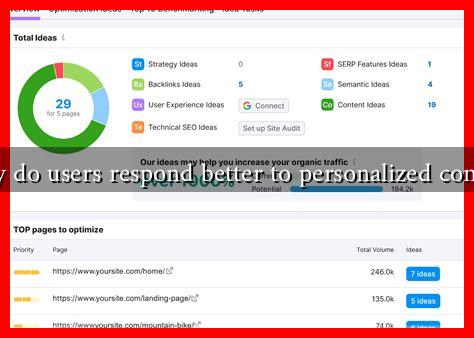-
Table of Contents
Why Do Users Respond Better to Personalized Content?
In the digital age, where information overload is a common challenge, personalized content has emerged as a powerful tool for engaging users. From tailored emails to customized product recommendations, personalization enhances user experience and drives better engagement. But why do users respond more favorably to personalized content? This article explores the psychology behind personalization, its benefits, and real-world examples that illustrate its effectiveness.
The Psychology of Personalization
At its core, personalization taps into fundamental psychological principles that govern human behavior. Here are some key reasons why users are more responsive to personalized content:
- Relevance: Personalized content is more relevant to the user’s interests and needs. When users see content that resonates with them, they are more likely to engage with it.
- Emotional Connection: Personalization fosters a sense of connection. When brands address users by name or recommend products based on past behavior, it creates a feeling of being understood.
- Reduced Information Overload: Personalized content helps filter out irrelevant information, making it easier for users to find what they are looking for.
Benefits of Personalized Content
Implementing personalized content strategies can yield significant benefits for businesses. Here are some of the most notable advantages:
- Increased Engagement: Personalized emails have an open rate of 29% higher than non-personalized emails, according to a study by Mailchimp.
- Higher Conversion Rates: E-commerce platforms that utilize personalized recommendations can see conversion rates increase by up to 10%.
- Improved Customer Loyalty: Brands that personalize their marketing efforts can enhance customer loyalty, with 80% of consumers more likely to make a purchase when brands offer personalized experiences.
Real-World Examples of Personalization
Several companies have successfully leveraged personalized content to enhance user engagement and drive sales. Here are a few notable examples:
- Amazon: Amazon’s recommendation engine is a prime example of effective personalization. By analyzing user behavior and purchase history, Amazon suggests products that users are likely to buy, resulting in increased sales.
- Netflix: Netflix uses personalized content recommendations based on viewing history. This strategy has been instrumental in keeping users engaged and reducing churn rates.
- Spotify: Spotify’s “Discover Weekly” playlist curates music based on user preferences, leading to higher user satisfaction and engagement.
Statistics Supporting Personalization
Numerous studies highlight the effectiveness of personalized content. Here are some compelling statistics:
- According to Epsilon, 80% of consumers are more likely to make a purchase when brands offer personalized experiences.
- A study by Accenture found that 91% of consumers are more likely to shop with brands that provide relevant offers and recommendations.
- Research from McKinsey indicates that personalization can lead to a 10-30% increase in revenue for businesses.
Challenges and Considerations
While personalization offers numerous benefits, it also comes with challenges. Businesses must navigate issues such as:
- Data Privacy: With increasing concerns about data privacy, companies must ensure they handle user data responsibly and transparently.
- Over-Personalization: Excessive personalization can lead to a feeling of intrusion. Striking the right balance is crucial.
- Technical Implementation: Developing effective personalization strategies requires sophisticated technology and data analytics capabilities.
Conclusion
In conclusion, personalized content significantly enhances user engagement by making interactions more relevant and meaningful. The psychological principles behind personalization, combined with its tangible benefits, make it a vital strategy for businesses looking to connect with their audience. As companies continue to innovate in this space, understanding the balance between personalization and privacy will be key to maintaining user trust and loyalty. By leveraging data responsibly and crafting tailored experiences, brands can foster deeper connections with their customers and drive long-term success.
For further reading on the impact of personalized content, check out this article on Forbes.

